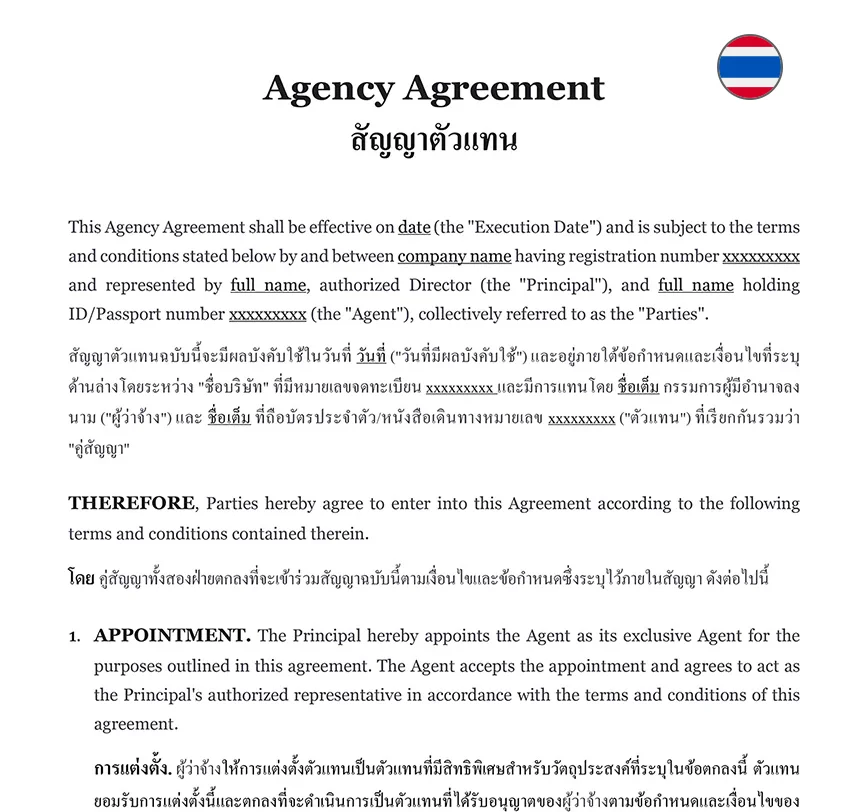Ready to use legal template
Drafted by experienced lawyers
Certified Thai-English translation
Ready to use legal template
Drafted by lawyers
Translated in Thai-English
Home › Business contracts › Agency Agreement
Learn more about Agency Agreement
These agreements play a pivotal role in defining roles, responsibilities, and obligations between principals and agents. At Themis Partner, we understand the importance of having a well-crafted Agency Agreement that complies with Thai law. That’s why we offer an easy-to-edit legal template, meticulously drafted by our expert lawyers, ensuring suitability for any agency type. Simplify your legal processes and protect your interests in Thailand’s competitive market with our comprehensive Agency Agreement template.
Table of contents
-
What is an Agency Agreement in Thailand?
-
Can I use this template for any kind of agency?
-
What does an Agency Agreement include?
-
Are Agency Agreements legally binding?
-
What rights and responsibilities do parties have?
-
How can an Agency Agreement be terminated?
-
What are the common disputes in Agency Agreements?
What is an Agency Agreement in Thailand?
An Agency Agreement in Thailand is a legally binding contract that establishes a formal relationship between two parties, known as the principal and the agent. This agreement outlines the terms and conditions under which the agent will represent and act on behalf of the principal in various business activities. In the context of Thailand, an Agency Agreement can cover a wide range of arrangements, from sales and marketing representation to distribution and service agreements. It specifies the roles, responsibilities, and obligations of both parties, including any commission or compensation structures.
This legal document is crucial for businesses operating in Thailand as it helps define the scope of authority, protect the interests of all parties involved, and ensures compliance with Thai law. Whether you’re a foreign company seeking local representation or a Thai business looking to engage an agent, having a well-drafted Agency Agreement is essential for a smooth and legally compliant business relationship.
Can I use this template for any kind of agency?
Yes, the provided Agency Agreement template from Themis Partner is designed to be versatile and suitable for various types of agency relationships in Thailand. Whether you are entering into a sales agency, marketing agency, distribution agency, or any other form of agency arrangement, the template can be customized to meet your specific needs.
The key advantage of using a template drafted by legal experts is its adaptability. You can tailor the agreement to include provisions, terms, and conditions that align with the unique requirements of your agency relationship. This flexibility ensures that the agreement accurately reflects the nature of your business arrangement while also complying with Thai legal regulations.
What does an Agency Agreement include?
An Agency Agreement is a comprehensive legal document that outlines the terms, conditions, and specifics of a business relationship between a principal and an agent. While the exact content may vary based on the nature of the agency and applicable laws, a typical Agency Agreement in Thailand includes the following key elements:
1. Identification of Parties
Clearly specify the names and contact details of the principal and the agent involved in the agreement.
2. Scope of Agency
Define the scope of authority granted to the agent, including the specific responsibilities and tasks they are authorized to undertake on behalf of the principal.
3. Duration and Termination
Outline the start and end dates of the agency relationship and the conditions under which either party can terminate the agreement.
4. Commission and Compensation
Specify the method and rate of commission or compensation that the agent will receive for their services. Include details about payment schedules.
5. Duties and Responsibilities
Detail the duties and responsibilities of both the principal and the agent, ensuring a clear understanding of each party’s role in the business relationship.
6. Confidentiality and Non-Disclosure
Address confidentiality obligations, ensuring that sensitive business information remains protected.
7. Intellectual Property
Define the use, ownership, and protection of intellectual property rights, such as trademarks, copyrights, or patents, as applicable.
8. Conflict of Interest
Address situations where the agent may have conflicts of interest and establish guidelines for handling such conflicts.
9. Compliance with Laws
Ensure that the agency relationship complies with all relevant laws and regulations in Thailand.
10. Indemnification and Liability
Clarify the extent of liability and the indemnification process in case of disputes, breaches, or damages.
11. Governing Law
Specify the jurisdiction and governing law that will apply in case of legal disputes.
12. Dispute Resolution
Outline the process for resolving disputes, whether through negotiation, mediation, or arbitration.
Are Agency Agreements legally binding?
To ensure the legality and enforceability of an Agency Agreement in Thailand, several important principles must be upheld. These include the use of clear and unambiguous language, the requirement of voluntary consent from both parties, adherence to Thai legal capacity requirements, compliance with local laws and regulations, proper execution with authorized signatures, and the presence of consideration, often in the form of commission or compensation. When these criteria are met, the Agency Agreement becomes a legally binding document that can be enforced through the Thai legal system or through alternative dispute resolution methods specified in the contract, providing assurance and protection for all parties involved in the agency relationship.
What rights and responsibilities do parties have?
The principal possesses the right to be represented by the agent in specific business activities and is responsible for compensating the agent according to the agreed-upon commission or compensation terms. Additionally, the principal has the authority to establish the parameters of the agent’s authority and is tasked with overseeing the agent’s actions to ensure they align with the principal’s interests. On the other hand, the agent has the authority to act on behalf of the principal within the scope of the agreement, with responsibilities including performing assigned duties diligently, maintaining confidentiality, adhering to applicable laws, and providing regular updates to the principal. It is essential that both parties comprehend and adhere to these rights and responsibilities as defined in the Agency Agreement to maintain a harmonious and effective working relationship.
How can an Agency Agreement be terminated?
An Agency Agreement in Thailand can be terminated through several distinct methods and under specific circumstances, as stipulated either within the agreement itself or in accordance with Thai legal regulations. Firstly, if the agreement has a predetermined duration, it will naturally conclude upon reaching the specified end date. Additionally, termination can occur through mutual consent, where both the principal and the agent agree to end the contract in writing. Breach of contract by either party may also lead to termination, though dispute resolution procedures should be followed initially. Specific termination clauses, such as those tied to sales targets, may be included in the agreement. Notice periods, if applicable, must be adhered to, and in cases of death or legal incapacity of either party, automatic termination provisions may apply. Changes in circumstances, such as legal or regulatory shifts, and unforeseen events covered under a force majeure clause, can also trigger termination.
What are the common disputes in Agency Agreements?
Agency Agreements in Thailand can give rise to a range of common disputes that affect both principals and agents. These disputes often revolve around issues such as non-payment of agreed-upon commissions, breaches of contract, disputes over the scope of the agent’s authority, disagreements regarding termination procedures, and conflicts of interest, especially in cases where agents represent multiple principals with competing interests. Disputes may also emerge concerning intellectual property rights, non-compete and non-disclosure clauses, financial accounting and reporting, force majeure events, compliance with laws, and misrepresentation. To preempt and effectively address these issues, it is essential for parties involved in Agency Agreements to utilize a well-drafted and comprehensive contractual template. Such a template should include provisions and guidelines specifically designed to mitigate the risk of disputes and provide clear instructions on dispute resolution processes when necessary, ultimately protecting the interests of all parties involved.
SPECIAL OFFER
Startup
15 Document Package
Essential documents for running your business in Thailand
Share information
Why Themis Partner?
Easy legal documents at your fingertips
Make trusted documents for hundreds of purposes.
Hundreds of documents
Instant access to our entire library of documents for Thailand.
24/7 legal support
Quick legal advice from our network of qualified lawyers.
Easily customized
Editable Word documents, unlimited revisions and copies.
No translation fees
Certified Thai-English translation included for all documents.
Legal and Reliable
Documents written by lawyers that you can use with confidence.
Free consultation
Free lawyer consultation on each new matter.




